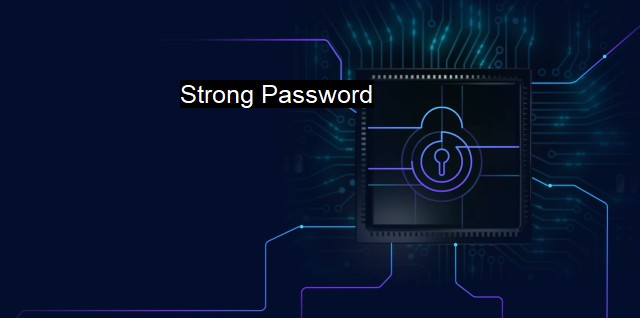What is Strong Password?
One term that is regularly broached is a "strong password". This terminus refers to a password that is designed meticulously with a sole purpose: to resist attempts at unauthorized access from various perpetrators. Widespread in diverse applications, from institutional networks to personal social media profiles, a strong password constitutes the first line of defense against cyber threats.Simply put, a strong password is a complicated password that's challenging to guess, difficult to decode by hacking programs, and unique to only you. It forms your primary endpoint security, protecting your physical or digital assets from nefarious cyber risks, such as hacking, identity theft, fraud, reputation damage, or data loss. A compelling password is a blend of not only a collection of data points but also the utilization of a sophisticated methodology that improves its resilience towards potential cybersecurity transgressions.
A strong password commonly features a mix of special characters, numbers, uppercase, and lowercase letters. It should be significantly long - typically, a password with at least 12 characters is a solid start, but 16 or more is recommended for superior security practices. Shorter passwords can be more readily attacked with a method known as ‘brute force’, where software runs through all possible combinations until the accurate one is found. Compared to their shorter counterparts, longer passwords exponentially augment the combinations puzzle, effectively raising the barricade with every extra character used.
Another vital feature is the preference for seemingly incoherent randomness. A strong password should avoid the user's personal insights or merely sequential keystrokes. Dictionary words, straightforward number sequences, shared catchphrases, essential dates, or convenient keyboard designs frequently appear among the first wave of attacker's scanning dragnets. Hence, transforming the coherent rationale into abstract randomness essentially turns the password puzzle from a guessing game to a lottery.
The uniqueness of the password is equally crucial. Even the strongest password loses its power if divergent accounts share it, as breaching one account presents an invitation for perpetrators to the entirety of your data. Password recycling might save mental energy but does so at the colossal expense of your digital safety.
The concept of the strong password isn't static; it continues to evolve with the progression of cybersecurity landscapes and threat environments. Over time, simpler passwords that once seemed formidable have become fairly easy for innovative hacking software to crack. Today, technology has taken user convenience into account and given rise to multi-factor authentication (MFA), Password Managers, and biometrics, all of which considerably boost the strength of passwords and reduce the risk of unauthorized incursions.
Antivirus software often encourages and supports the setting of strong passwords. In addition to their core function of shielding the system from malicious programs, they also embody built-in features to verify your password's strength. Some advanced antivirus platforms even feature password managers or propose automatic strong password generation to better secure your data.
Excellent password hygiene forms the most basic and proactive line of defense against cyber intrusion attempts. It revolves around maintaining resilient passwords that withstand the scaling sophistication of cyber threats. To sum up, a diversified, lengthier, frequently updated, inexorably unique, and usually unpredictable strong password reinforces a robust and relentless digital fortress against the mounting threats in an increasingly cybernetic environment.
Remember, a strong password doesn't completely eliminate the risk, but it certainly adds a critical layer of security. it bolsters guarding mechanisms, fortifies your protective shield, and renders your cyber world much safer, thus enabling you to seamlessly navigate across the digital landscape. Stringent password practices, coupled with reputable antivirus software and cybersecurity awareness, form an integral component in actualizing a safer browsing atmosphere and assured data security.

Strong Password FAQs
What is a strong password?
A strong password is a combination of characters, including uppercase and lowercase letters, numbers, and symbols, and it should be at least 12 characters long. It should not include any common words, dictionary words, or personal information.Why is it important to use a strong password?
Using a strong password is important because it reduces the likelihood of being hacked or having your personal information stolen. Cybercriminals use password-cracking tools that can easily guess simple and common passwords.How can I create and remember a strong password?
You can create a strong password by using a passphrase that includes a mix of upper and lowercase letters, numbers, and symbols. Make sure it is at least 12-15 characters long, and avoid using personal information that can be easily guessed. To remember your password, you can use a password manager or write it down in a secure location.Can antivirus software protect my passwords?
Antivirus software cannot protect your passwords directly, but it can protect your computer or device from malware, which is a common tool used by cybercriminals to steal personal information, including passwords. It is still important to use a strong password and not to share it with anyone or use it on unsecured websites.| | A | | | B | | | C | | | D | | | E | | | F | | | G | | | H | | | I | | | J | | | K | | | L | | | M | |
| | N | | | O | | | P | | | Q | | | R | | | S | | | T | | | U | | | V | | | W | | | X | | | Y | | | Z | |
| | 1 | | | 2 | | | 3 | | | 4 | | | 7 | | | 8 | | |||||||